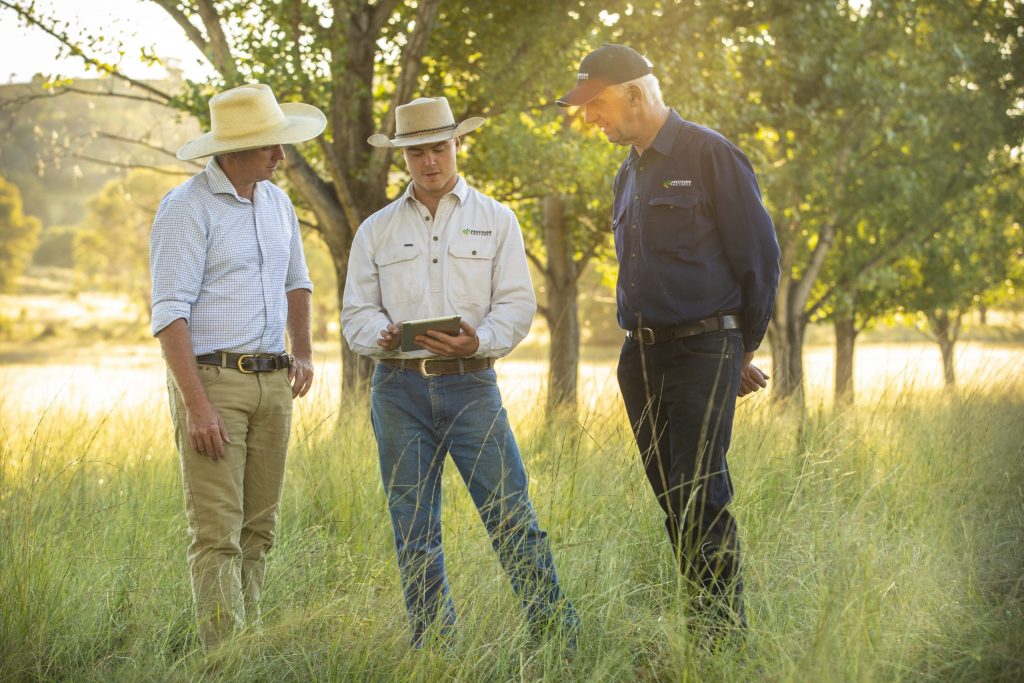SOIL TESTING FOR CARBON FARMING – WHAT’S INVOLVED AND WHY PRODUCERS ARE CONSIDERING IT

Carbon farming has fast become a buzz term in agriculture, with many farmers keen to understand what’s involved and whether it is a genuine opportunity. As a consulting agronomist with an understanding of soil and pasture management, Precision Pastures managing director Milton Curkpatrick explains how soil testing is involved and what farmers can do to obtain early indicators around their carbon farming potential.
Precision Pastures is pioneering soil carbon sampling and testing for carbon farming initiatives. With its purpose-built equipment and software, the company can determine initial soil carbon levels, sequestration potential and can complete carbon farming audit requirements including baseline soil sampling.
Precision Pastures managing director Milton Curkpatrick says he is seeing livestock and cropping producers seek out these activities and services more and more each day and it’s easy to understand why.
“Firstly, there are added production benefits from improving your soil carbon, such as improved water-use efficiency, increased productivity, profitability and a healthier ecosystem,” Milton says.
“These are obvious drivers for livestock producers as goals they’re probably setting anyway, especially when it comes to optimising their pasture performance and on-farm biodiversity. Now, we’re seeing added benefits from soil carbon increases in the form of Australian Carbon Credit Units (ACCUs), which open up a whole new revenue source for farmers.”
Given the expertise Precision Pastures has in soil sampling and testing, the company is already geared up for the operational processes involved in carbon farming.
Precision Pastures offers an initial, low-cost Carbon Performance Assessment, a service which helps farmers understand their soil carbon levels before committing to registering for a carbon project.
“The advantage of our Carbon Performance Assessment is that it provides an early indication of whether there is potential to sequester carbon – it’s like a situation analysis for the landowner – where we examine those soil tests and can ascertain whether carbon farming is worth pursuing,” Milton explains.

“We do this to check the main attributes of the soil which can include soil texture, bulk density, carbon, cation exchange capacity, conductivity – all the soil properties that give you primary indicators to sequester carbon.”
All core samples are conducted to a depth of one metre. Milton explains this helps obtain a full profile of where carbon can be sequestered, which can lead to further upside for the farmer.
“The deeper we go, the more opportunity there is to sequester more carbon. However, therein lies the challenge. You need roots growing below the surface and the deeper the better. That is how we increase organic matter into the soil,” he says.
After the scientific verification of carbon levels, the insights provided by the Carbon Performance Assessmentprovide the landowner with confidence around whether they could formally register a carbon farming project to enable payment for increases in soil carbon levels in the form of ACCUs. There are several steps involved in a carbon project establishment and registration, outlined below:
- 1. Complete the Precision Pastures Carbon Performance Assessment and establish whether there is real potential to farm carbon
- 2. Engage a recognised carbon farming agent/consultant (see below) to develop a carbon management plan incorporating the farming practice change required to increase soil organic carbon levels within the soil profile
- 3. Have the agent register the carbon project with the Federal Government’s Clean Energy Regulator (CER)
- 4. Consider all contract options for the sale of the ACCUs – government and private markets
- 5. Complete the baseline soil sampling process – this requires rigorous planning mapping, recording analysis and record keeping. The government methodology requires a minimum of three testing regimes to establish the baseline, for statistical purposes and a testing regime to trigger the issue of ACCU’s
To register a project there are companies such as Australian Soil Management, Carbon Link, and Agriprove, whose core business is dealing with government and legislation, navigating the formalities of meeting the criteria to generate carbon credits. There is an upfront cost to the administration and project management, annual costs in the monitoring phase, then when the credits are issued, most companies take a success fee upon crediting.
For more information on soil testing for carbon farming or to organise Precision Pastures to conduct a Carbon Performance Assessment, contact us today: milton@precisionpastures.com.au or 0427 247 045.

